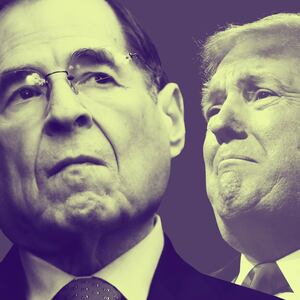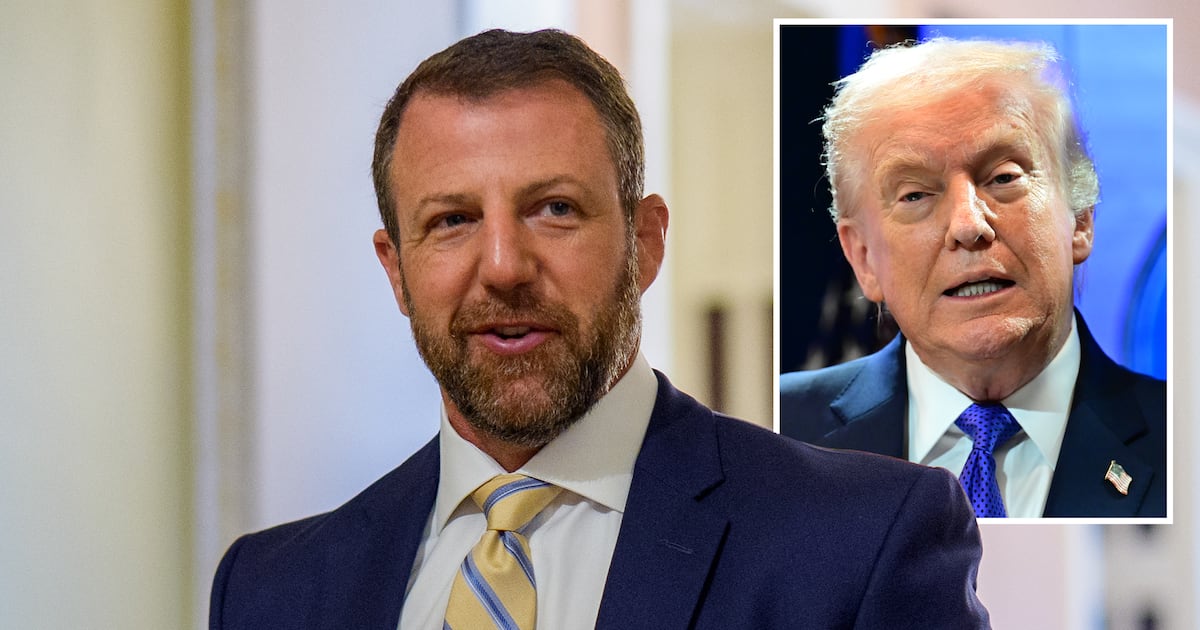The House of Representatives is stymied. The Democratic majority is deeply divided over whether to initiate proceedings that might culminate in the impeachment of President Trump. Knowing that the Republican Senate will never convict—so long as the president’s base remains unshaken by misconduct short of homicide on Fifth Avenue—House leadership is understandably reluctant to pull the impeachment trigger. And knowing that impeachment is off the table, the president is emboldened to stonewall every congressional demand for documents and testimony, derailing even basic oversight hearings before they’ve begun.
Sure, the House can go to court to seek enforcement of its subpoenas. And if it does, it is likely to prevail; the president’s flat refusal to honor congressional prerogatives is almost certainly unconstitutional. But all that fancy constitutional skirmishing will prove cold comfort to those looking to hold Trump responsible for the plainly obstructive conduct detailed in the Mueller Report. Litigation grinds slowly, and the White House, doubtless aware of the weakness of its legal position, is obviously hoping that a protracted court fight will run out the clock until 2020, or (heaven help us) even four years hence.
How did this happen, and what can Congress do about it? On Friday, House Judiciary Chairman Jerrold Nadler and two other Democrats on the committee introduced the No President Is Above the Law Act, a tolling bill that would pause the statute of limitations for any federal offense committed by a sitting president.
It’s an overdue fix to at least part of our current predicament. Though that predicament has many sources, a principal culprit is the Opinion of the DOJ Office of Legal Counsel (OLC), first adopted in 1973 and reaffirmed in 2000, that a sitting president cannot be indicted. Constrained by this opinion, Robert Mueller refrained from charging Trump with any of the crimes established in Volume II of the Report. And Mueller then went a critical step further (mistakenly, in my view): He refrained even from articulating a judgment as to whether Trump had obstructed justice. In Mueller’s view, to pronounce such a judgment, without actually indicting Trump, would unfairly deny the president an opportunity to vindicate his innocence.
The upshot, as the last few weeks have confirmed, was predictable for anyone who bothered to read Attorney General Barr’s 19-page audition script for his current job. Believing, as he did, that the entire suite of crimes under investigation by Mueller could never constitute obstruction of justice, no matter how self-serving the president’s motives, Barr swiftly exonerated the president of obstruction. That decision, in turn, enabled Trump and his allies to claim total vindication, announce that the entire Russia-related investigation is “over”, and insist that further congressional proceedings of any kind would be an unwarranted “redo.”
So here’s a novel idea for Congress—it can legislate. It can, and should, enact a statute with two basic provisions: (i) henceforth, a sitting president may be indicted; and (ii) in the event that the Department of Justice nevertheless declines to charge a sitting president, then any period of time during which the president serves in office shall not count toward the running of the statute of limitations for offenses with which he could be charged.
The OLC opinion itself is ripe for a legislative fix. Even in 1973, the arguments for conferring a sitting president with absolute immunity from indictment were quite insubstantial. OLC itself acknowledged that neither the text nor history of the Constitution actually provides any such protection. Indeed, the 1973 opinion was principally focused on whether a sitting vice president could be indicted—the opinion was prompted by the Spiro Agnew Investigation—and concluded that he could be. Seemingly as an afterthought, OLC concluded that a “balancing” of costs and benefits tipped against indictment of a president because such criminal proceedings would “unduly interfere in a direct or formal sense with the conduct of the Presidency.”
When OLC revisited this opinion in 2000, this time prompted by the Clinton inquiries, the legal landscape had shifted, and the already-thin ice supporting the 1973 opinion had now cracked wide open. In its 1997 decision in the Paula Jones case, the Supreme Court had held that a sitting president may not only be civilly sued, but must also respond to discovery and may be tried to verdict. The court speculated that the Jones civil lawsuit, “if properly managed by the district court,” was “highly unlikely to occupy any substantial amount of [President Clinton’s] time.”
But history has judged that prediction harshly. The district court, in a ruling of dubious validity, permitted Jones’s lawyers to question Clinton about other romantic relationships, and he famously answered falsely when asked a question pertaining to Monica Lewinsky. The rest, as they say, is history: Clinton’s false testimony became fodder for Kenneth Starr’s Independent Counsel investigation, which in turn resulted in a full-scale impeachment proceeding in the House and Senate—all the outgrowth of the Supreme Court’s surmise that a little bit of civil litigation would not hamper the president’s discharge of his duties.
But Clinton v. Jones was the law by 2000, and OLC had to do handsprings to explain why, notwithstanding that decision, the indictment of a sitting president was verboten. Criminal charges, OLC insisted, held a greater “stigma” for a president, and would require considerably more “mental preoccupation” for the president than mere civil litigation. Conversely, said OLC, the government could always prosecute the president after he leaves office, whether at the end of his term or following resignation or impeachment and removal.
Every step in that analysis is deeply flawed. Civil litigation can be just as stigmatizing as any criminal case, and more so than many—just ask Clinton about Paula Jones’s accusations. Nor is it true that the government can always prosecute after the president leaves office. As OLC itself acknowledged, the statute of limitations may run while the president is in office; and while OLC imagined that a court may agree to freeze (or, as lawyers say, “toll”) the statute of limitations for the period of time the president was in office, there is abundant case law casting substantial doubt on a court’s power to cut prosecutors such slack.
The OLC opinion is also deeply inconsistent. On the one hand, it contends that an indictment—even a sealed indictment (one that is not made public until the president has left office)—is too stigmatizing and preoccupying to the president in his discharge of constitutional duties. On the other hand, in explaining why there is no material risk that evidence may be lost while the president remains in office, OLC hypothesizes that “a grand jury could continue to gather evidence throughout the period of immunity.” Now there’s a principled distinction for you: In OLC’s view, it’s OK for a grand jury to call witnesses to testify against a sitting president, to gather documentary evidence against a sitting president, and to consider charges against a sitting president; but the grand jury may not actually indict the president, even under seal, for fear that doing so will distract from his workday.
In short, there are good reasons for Congress to jettison the OLC opinion entirely. Doing so might well free Mueller to provide his own views on the merits (which he is otherwise unlikely to share). It might prompt a future OLC to abandon the 1973 and 2000 immunity opinions. And overruling the OLC opinion would certainly enable future special counsels to do the job they are appointed to do.
Of course, there is substantial doubt that congressional Republicans would be willing to legislate the OLC opinion out of existence, at least for now. But it is worth forcing them to say so on the record and cast their lot with an increasingly regal presidency. And even the Republicans may be willing to take the smaller legislative step I’m proposing (which even the 2000 OLC opinion suggested): passing a provision stating that any period of time during which the president enjoys “OLC immunity”—either because the OLC opinion has not been legislatively overruled or because the Justice Department adheres to its opinion anyway—shall not count towards the lapsing of any applicable statute of limitations.
Doing so would avoid the predicament we now face with Trump: Were he re-elected, the five-year statute of limitations on his offenses will almost surely have run.
The tolling bill—either bundled with legislation overruling the OLC opinion or as freestanding legislation—would fix the problem. And despite Trump’s ferocious support among congressional Republicans, I hold out hope that even Republicans would support a tolling bill that would place Trump, after he leaves office, no better off than any other person in what we used to call a Nation of Laws.







